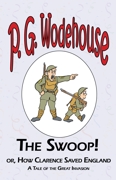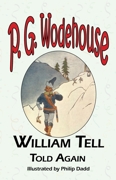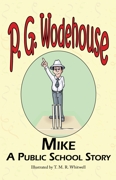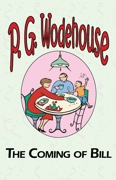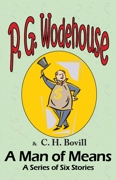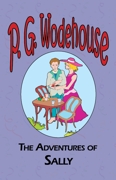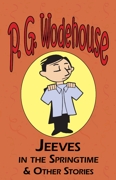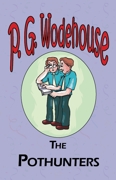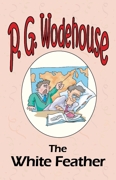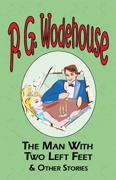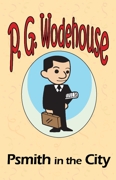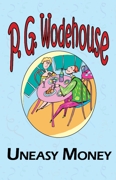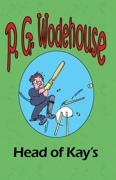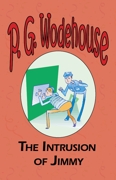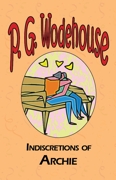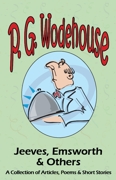|
Click here to go back to
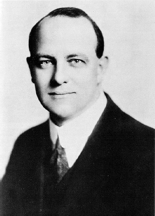
Sir Pelham Grenville Wodehouse, KBE (15 October 1881
– 14 February 1975) was a comic writer who has
enjoyed enormous popular success for more than seventy years. Despite all the
political and social upheavals that occurred during his life, much of which was
spent in France and the United States, Wodehouse's
main canvas remained that of prewar English upper-class society, reflecting
his birth, education, and youthful writing career.
An acknowledged master of English prose, Wodehouse was admired both by contemporaries like
Hilaire Belloc, Evelyn Waugh and Rudyard Kipling as well
as by modern writers like Douglas Adams, Salman Rushdie and Terry Pratchett. Sean O'Casey famously called him "English
literature's performing flea", a description that Wodehouse used as the title of
a collection of his letters to a friend, Bill Townend.
Best known today for the Jeeves and
Blandings Castle
novels and short stories, Wodehouse was also a talented playwright and lyricist
who was part author and writer of fifteen plays and of 250 lyrics for some
thirty musical
comedies. He worked with Cole Porter on the musical Anything Goes (1934) and frequently
collaborated with Jerome
Kern and Guy Bolton. He
wrote the lyrics for the hit song "Bill" in Kern's Show Boat (1927), wrote the lyrics for the Gershwin - Romberg musical Rosalie (1928), and collaborated with
Rudolph Friml on a
musical version of The Three Musketeers
(1928).
Life
P. G. Wodehouse in his last days.
Wodehouse, called "Plum" by most family and friends, was born prematurely to
Eleanor Wodehouse (née Deane) whilst she was visiting Guildford. His father Henry Ernest Wodehouse
(1845–1929) was a British judge in Hong Kong. The Wodehouse family had been settled in
Norfolk for many centuries.
Wodehouse's great-grandfather Reverend Philip Wodehouse was the second son of Sir Armine Wodehouse, 5th
Baronet, whose eldest son John Wodehouse, 1st Baron
Wodehouse, was the ancestor of the Earls of Kimberley.
He attended boarding school, where he saw his parents only once every six or
seven months. Wodehouse grew very close to his brother, who shared his love for
art. Wodehouse filled the voids in his life by writing relentlessly. He spent
quite a few of his school holidays with one aunt or another; it has been
speculated that this gave him a healthy horror of the "gaggle of aunts",
reflected in Bertie
Wooster's formidable aunts Agatha and Dahlia, as well as Lady Constance
Keeble's tyranny over her many nieces and nephews in the Blandings Castle
series.
Wodehouse was educated at Dulwich College, where the library is now named
after him, but his anticipated progression to university was stymied by family
financial problems. Subsequently he worked for the Hong Kong and Shanghai Bank in London (now known as HSBC)
for two years, though he was never interested in banking as a career. He wrote
part-time while working in the bank, eventually proving successful enough to
take up writing as a full-time profession. He was a journalist with The
Globe (a defunct English newspaper) for some years before moving to New
York, where he worked for a time as theatre critic of "The New Yorker",
collaborated with Guy Bolton and Jerome Kern on several musical comedies, and
began publishing short stories and novels. In the 1930s, he had two brief stints
as a screenwriter in Hollywood,
where he claimed he was greatly over-paid. Many of his novels were also
serialised in magazines such as The Saturday Evening Post and
The Strand,
which also paid well.
Wodehouse married Ethel Wayman in 1914,
gaining a stepdaughter, Leonora. He had no natural children, perhaps owing to
having contracted mumps as a young
man.
Life in France
Although Wodehouse and his novels are considered quintessentially English,
from 1914 onward he shared his time between England and the United States. In
1934, he took up residence in France, to avoid double taxation on his earnings
by the tax authorities in Britain and the US. He was also profoundly
uninterested in politics and world affairs. When World War II broke out in 1939 he remained at his
seaside home in Le Touquet, France, instead of returning to England,
apparently failing to recognise the seriousness of the conflict. He was
subsequently taken prisoner by the Germans in 1940 and interned by them for a
year, first in Belgium, then at Tost
(now Toszek) in Upper Silesia (now in Poland). (He is recorded as saying, "If this is Upper
Silesia, one must wonder what Lower Silesia must be like...".)
While at Tost, he entertained his fellow prisoners with witty dialogues.
After being released from internment, a few months short of his 60th birthday,
he used these dialogues as a basis for a series of radio broadcasts aimed at
America (but not England) that the Germans persuaded him to make from Berlin. Wartime England was in no mood for
light-hearted banter, however, and the broadcasts led to many accusations of collaboration with the Nazis and even treason. Some libraries banned
his books. Foremost among his critics was A. A. Milne, author of the Winnie the Pooh books;
Wodehouse got some revenge by creating a ridiculous character named Timothy
Bobbin, who starred in parodies of some of Milne's children's poetry. Among
Wodehouse's defenders were Evelyn Waugh and George Orwell. An investigation
by the British security service MI5 concluded
that Wodehouse was naive and foolish but not a traitor.[1]
The criticism led Wodehouse and his wife to move permanently to New York.
Apart from Leonora, who died during Wodehouse's internment in Germany, they had
no children. He became an American citizen in 1955 and never returned to his
homeland, spending the remainder of his life in Remsenburg, Long Island.
Later life
He was made a Knight Commander of the Order of the
British Empire (KBE) shortly before his death at the age of 93. It is widely
believed that the honour was not given earlier because of lingering resentment
about the German broadcasts. In a BBC
interview he said that he had no ambitions left now that he had been knighted
and there was a waxwork of him in Madame Tussaud's Wax Museum.
In 2000, the Bollinger Everyman Wodehouse
Prize was established and named in honour of PG Wodehouse and awards an
annual prize for the finest example in the UK of comic writing.
Writing Style
Wodehouse took a modest attitude to his own works. In Over Seventy (1957) he
wrote:
- "I go in for what is known in the trade as 'light writing' and those who do
that – humorists they are sometimes called – are looked down upon by the
intelligentsia and sneered at."
In the same article, Wodehouse names some contemporary humorists whom he held
in high regard. These include Frank Sullivan, A. P. Herbert, and Alex Atkinson.
Characters
Wodehouse's characters, however, were not always popular with the
establishment, notably the foppish foolishness of Bertie Wooster. Papers released by the Public Record
Office have disclosed that when P. G. Wodehouse was recommended in 1967 for
a Companion of Honour, Sir
Patrick Dean, the British ambassador in Washington, argued that it "would also
give currency to a Bertie Wooster image of the British character which we are
doing our best to eradicate."
Wodehouse's characters are often eccentric, with peculiar attachments, such
as to pigs (Lord
Emsworth), newts (Gussie Fink-Nottle), or socks (Archibald
Mulliner). His "mentally negligible" good-natured characters invariably make
their lot worse by their half-witted schemes to improve a bad situation.
Wodehouse's aristocrats, however, embody many of the comic attributes that
characterize buffoons. In many cases the classic eccentricities of Wodehouse's
upperclass give rise to plot complications.
Relatives, especially aunts and uncles, are commonly depicted with an
exaggerated power to help or impede marriage or financial prospects, or simply
to make life miserable. Friends are often more a trouble than a comfort in
Wodehouse stories: the main character is typically being placed in a most
painful situation just to please a friend. Antagonists (particularly rivals in
love) are frequently terrifying and just as often get their come-uppance in a
delicious fashion.
Policemen and magistrates are typically portrayed as threatening,
yet easy to fool, often through the simple expedient of giving a false name. A
recurring motif is the theft of policemen's helmets.
In a manner going back to the stock characters of Roman comedy (such as Plautus), Wodehouse's servants are
frequently far cleverer than their masters. This is quintessentially true with
Jeeves, who always pulls Bertie Wooster
out of the direst scrapes. It recurs elsewhere, such as the efficient (though
despised) Baxter,
secretary to the befogged Lord Emsworth.
Plots
Although his plots are on the surface formulaic, Wodehouse's genius lies in
the tangled layers of comedic complications that the characters must endure to
reach the invariable happy ending. Typically, a relative or friend makes some
demand that forces a character into a bizarre situation that seems impossible to
recover from, only to resolve itself in a clever and satisfying finale. The
layers pile up thickly in the longer works, with a character getting into
multiple dangerous situations by mid-story. An outstanding example of this is
The
Code of the Woosters where most of the chapters have an essential plot
point reversed in the last sentence, catapulting the characters forward into
greater diplomatic disasters.
Engagements are a common theme in Wodehouse stories. A man may be unable to
become engaged to the woman he loves due to some impediment. Just as often, he
becomes unwillingly, or even accidentally, engaged to a woman he does not love
and needs to find some back-door way out other than breaking it off directly
(which goes against a gentleman's code of honour). A case in point is Freddie in
Something Fresh, where his engagement to Miss Peters apparently broke off
after she eloped with George Emerson. A very sad situation of a girl choosing a
spirited man instead of her dim witted fiancée was cleverly made light hearted
by showing how Freddie could not care less, as he was more interested in meeting
the revered writer of detective stories: Ashe Marson and so on.
Assumed identities and resulting confusion are particularly common in the
Blandings books.
Gambling often plays a large role in Wodehouse plots, typically with someone
manipulating the outcome of the wager.
Another subject which features strongly in Wodehouse's plots is alcohol, and many
plots revolve around the tipsiness of a major character. It is clear that
Wodehouse himself was fond of a tipple, and he enumerated what many people
consider as the definitive list of hangovers: the Broken Compass, the Sewing
Machine, the Comet, the Atomic, the Cement Mixer and the Gremlin Boogie.
Furthermore, he makes several references to a drink called the "May Queen",described by
Uncle Fred as "any good dry
champagne, to which is added liqueur brandy, armagnac, kummel, yellow
chartreuse, and old stout, to taste", which inspires several characters to acts
of daring, such as proposing to their true loves.
Writings
Wodehouse was a prolific author, writing ninety-six books in a career
spanning from 1902 to 1975. His works include novels, collections of short
stories, and a musical comedy. Many characters and locations appear repeatedly
throughout his short stories and novels, leading readers to classify his work by
"series", being:
-
The Blandings
Castle stories (later dubbed "the Blandings Castle Saga" by Wodehouse), about the
upper-class inhabitants of the fictional rural Blandings Castle. Includes the
eccentric Lord Emsworth,
obsessed by his prize-winning pig, the "Empress of Blandings", and at one point by
his equally prize-winning pumpkin ("Blandings' Hope", but, mockingly, "Percy" to
Emsworth's unappreciative second son Freddie Threepwood).
-
The Drones Club stories,
about the mishaps of certain members of a raucous social club for London's idle
rich. Born in the Jeeves stories, it became its own informal series of short
stories, mostly featuring club members Freddie Widgeon or Bingo Little, plus a cast of recurrent bit players
such as Club millionaire Oofy
Prosser.
-
The Golf and Oldest
Member stories. They are built around one of Wodehouse's passions, the sport
of golf, which all characters involved
consider the only important pursuit in life. The Oldest Member of the golf
course clubhouse tells most of them.
-
The Jeeves and Wooster stories,
narrated by the wealthy, scatterbrained Bertie Wooster. A number of stories and novels
that recount the improbable and unfortunate situations in which he and his
friends find themselves and the manner in which his ingenious valet Jeeves is always able to extricate them.
Collectively called "the Jeeves stories", or "Jeeves and Wooster", they are
Wodehouse's most famous. The Jeeves stories are a valuable compendium of
pre-World War II English
slang in use, perhaps most closely mirrored in American
literature, although at a different social level, by the work of Damon Runyon.
-
The Mr Mulliner stories,
about a long-winded pub raconteur who tells outrageous stories about his family,
all surnamed Mulliner. His sometimes unwilling listeners are always identified
solely by their drinks, e.g., a "Hot Scotch and Lemon" or a "Double Whisky and
Splash".
-
The Psmith stories, about an
ingenious jack-of-all-trades with a charming, exaggeratedly refined manner. The
final Psmith story, Leave it to Psmith, overlaps the
Blandings stories in that Psmith works for Lord Emsworth, lives for a time at
Blandings Castle, and becomes a friend of Freddie Threepwood.
-
The School stories, which launched Wodehouse's career with their comparative
realism. They are often located at the fictional public schools of St. Austin's or Wrykyn.
-
The Ukridge stories, about the
charming but unprincipled Stanley Featherstonehaugh Ukridge, always looking to
enlarge his income through the reluctant assistance of his friend in his
schemes.
-
The Uncle Fred stories,
about the eccentric Earl of Ickenham. Whenever he can escape his wife's
chaperonage, he likes to spread what he calls "sweetness and light" and others
are likely to call chaos. His escapades, always involving impersonations of some
sort, are usually told from the viewpoint of his nephew and reluctant companion
Reginald "Pongo"
Twistleton. Several times he performs his "art" at Blandings Castle.
Adaptations
Considering the extent of his success, there have been comparatively few
adaptations of Wodehouse's works, in part because he was reluctant to do so:
"One great advantage in being a historian to a man like Jeeves is that his
mere personality prevents one selling one's artistic soul for gold. In recent
years I have had lucrative offers for his services from theatrical managers,
motion-picture magnates, the proprietors of one or two widely advertised
commodities, and even the editor of the comic supplement of an American
newspaper, who wanted him for a "comic strip". But, tempting though the terms
were, it only needed Jeeves deprecating cough and his murmured "I would scarcely
advocate it, sir," to put the jack under my better nature. Jeeves knows his
place, and it is between the covers of a book." (from Wodehouse's introduction
to the compilation The World of Jeeves, 1967)
A Damsel in Distress was
adapted in the 1937 film starring Fred Astaire, George Burns, Gracie Allen, and Joan Fontaine. A 1962 film adaptation of The Girl On The
Boat starred Norman
Wisdom, Millicent
Martin and Richard
Briers.
Both the Blandings and Jeeves stories have been adapted as BBC television series: the Jeeves series has been adapted
twice, once in the 1960s (for the BBC), with the title World of
Wooster, starring Ian Carmichael as Bertie Wooster, and Dennis Price as Jeeves—and
again in the 1990s (by Granada Television for ITV), with the title Jeeves and Wooster, starring Hugh Laurie as Bertie and Stephen Fry as Jeeves. David Niven and Arthur Treacher also
starred as Bertie and Jeeves, respectively, in a short 1930s film that was a
very loose adaptation of Thank You, Jeeves, and Treacher played Jeeves
without Bertie in an original sequel, Step Lively, Jeeves.
In 1975, Andrew Lloyd Webber made a musical,
originally titled Jeeves. In 1996, it was rewritten as the more
successful By Jeeves,
which made it to Broadway, and a performance recorded as a video film, also
shown on TV.
A version of Heavy Weather was filmed by the BBC in 1995
starring Peter O'Toole
as Lord Emsworth and Richard Briers, again, as
Lord Emsworth's brother, Galahad Threepwood.
In 2004, Julian Fellowes wrote a screen adaptation of
Piccadilly Jim
which starred Sam
Rockwell. The film was not successful.
There was also a series of BBC adaptations
of various short works, mostly from the Mulliner series, under the title of
Wodehouse
Playhouse starring John Alderton and Pauline Collins, which aired starting in 1975. The first series was introduced by
Wodehouse himself, which was extraordinary considering he was 93 at the time and
died the year the TV series started.
Arthur,
starring Dudley Moore and
Sir John Gielgud, and its
sequel Arthur II: On the Rocks, were also an adaptation of the characters
of Bertie and Jeeves, although not officially acknowledged, and many of the
lines and incidents from the movie, including the main plot involving an
engagement, were directly influenced by Wodehouse's characters.
Wodehouse's involvement with film and television from around the world is
chronicled in Brian Taves, P.G. Wodehouse and Hollywood: Screenwriting,
Satires, and Adaptations (McFarland, 2006).
Major Characters
-
Major Characters of Primary Importance
Wodehouse's work contains a number of recurring protagonists, narrators and
principal characters, including:
-
Major characters of secondary importance
Certain Wodehouse's less central characters are particularly well-known,
despite being less critical elements of his works as a whole.
- Anatole, chef extraordinaire
- Galahad
Threepwood, Lord Emsworth's brother, lifelong bachelor with a mis-spent
youth and a kind heart
- Sebastian Beach,
Lord Emsworth's butler
- Rupert Baxter, Lord
Emsworth's efficient secretary
- Major
Brabazon-Plank, Amazon explorer, afraid of bonnie babies
- Sir
Roderick Glossop, psychiatrist who appears every time it could make matters
worse
- Tuppy Glossop, Sir
Roderick's nephew
- Roderick Spode, 8th
Earl of Sidcup, amateur dictator
- Pongo
Twistleton, Uncle Fred's nephew
- Oofy Prosser,
millionaire member of the Drones Club
- Monty Bodkin, second
richest member of the Drones Club (second to Oofy Prosser)
- Bingo Little, friend
of Bertie Wooster
- Freddie Widgeon,
member of the Drones Club
- Gussie
Fink-Nottle, noted newt fancier
- Sir Watkyn
Bassett, owner of Totleigh Towers
- Madeline
Bassett, daughter of Sir Watkyn
- Florence Craye,
Bertie Wooster's cousin and author of the novel Spindrift
- Lord Uffenham, owner
and butler of Shipley Hall
- Mike Jackson, Psmith's steadfast,
cricket-playing friend
- Archibald
Mulliner, sock collector who can mimic a hen laying an egg
Article on P. G. Wodehouse excerpted from Wikipedia, the free encyclopedia" The Full article may be read by clicking here.
All users are free to copy and use this article on P. G. Wodehouse (but NOT including downloaded books, books purchased through link on this site, or any other material residing locally on this site or linked to this site) as per Wikipedia's rules and the GNU Free Documentation License (version 1.2, dated 11/2002 as of this posting which may be superceded by later versions). You may view a copy of this license by clicking here.
A history of changes made to the original article on Wikipedia may be obtained by clicking here.
|


